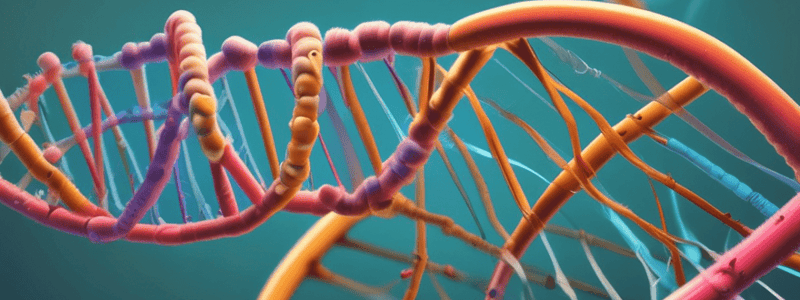Podcast
Questions and Answers
What is the total number of chromosomes in humans?
What is the total number of chromosomes in humans?
- 50 chromosomes
- 23 chromosomes
- 48 chromosomes
- 46 chromosomes (correct)
Which field of genetics focuses on the breeding and improvement of crops and livestock?
Which field of genetics focuses on the breeding and improvement of crops and livestock?
- Agricultural Genetics (correct)
- Forensic Genetics
- Medical Genetics
- Mutations Genetics
What process leads to the formation of a diverse range of offspring with different genetic traits?
What process leads to the formation of a diverse range of offspring with different genetic traits?
- Mendelian Genetics
- Genetic Recombination (correct)
- Genetic Mapping
- Heredity
Which term refers to changes in the DNA sequence of a gene that can cause both beneficial and harmful effects?
Which term refers to changes in the DNA sequence of a gene that can cause both beneficial and harmful effects?
What does medical genetics focus on?
What does medical genetics focus on?
What does genetic mapping involve?
What does genetic mapping involve?
What is the molecule that contains the genetic instructions for all living organisms?
What is the molecule that contains the genetic instructions for all living organisms?
Which of the following is NOT a key concept in genetics as mentioned in the text?
Which of the following is NOT a key concept in genetics as mentioned in the text?
What are alleles?
What are alleles?
Which genetic component is responsible for the production of proteins or functional RNA molecules?
Which genetic component is responsible for the production of proteins or functional RNA molecules?
What does genetics focus on?
What does genetics focus on?
In genetics, what are two alleles an organism typically inherited for each gene?
In genetics, what are two alleles an organism typically inherited for each gene?
Flashcards are hidden until you start studying
Study Notes
Genetics in Biology
Genetics is the study of heredity and the variation of inherited traits from one generation to the next. It is a fundamental part of biology, as it helps explain how traits are passed down from parents to their offspring. Genetics plays a crucial role in understanding the evolution of species and the diversity of life on Earth.
The Study of Genetics
Genetics focuses on the inheritance of traits and the mechanisms that underlie these patterns of transmission. It involves the identification of specific genes and their roles in the development, function, and maintenance of living organisms. Genetics has applications in many areas of biology, including human health, agriculture, and environmental science.
Key Concepts in Genetics
-
DNA: Deoxyribonucleic acid (DNA) is the molecule that contains the genetic instructions used in the growth, development, functioning, and reproduction of all living organisms. DNA is composed of two long chains of nucleotides that are coiled around a core of histone proteins to form a structure called chromatin.
-
Genes: Genes are segments of DNA that contain the information for the production of proteins or functional RNA molecules. Genes are responsible for the inherited traits and characteristics of an organism.
-
Alleles: Alleles are alternative forms of a gene that are found at a specific location on a pair of homologous chromosomes. An organism has two alleles for each gene, one inherited from each parent.
-
Chromosomes: Chromosomes are the thread-like structures that contain an organism's genetic material. Humans have 23 pairs of chromosomes, resulting in a total of 46 chromosomes.
-
Heredity: Heredity refers to the passing of traits or characteristics from one generation to the next. The genetic makeup of an organism is determined by the combination of genes inherited from its parents.
-
Mendelian Genetics: Mendelian genetics is the study of the inheritance of traits that follow the principles of inheritance established by Gregor Mendel. These principles include the idea that traits are determined by pairs of alleles and that only one allele from each pair is passed to the offspring.
-
Mutations: Mutations are changes in the DNA sequence of a gene. Mutations can cause changes in the organism's traits and can have both beneficial and harmful effects.
-
Genetic Recombination: Genetic recombination is the process by which an organism's genetic material is shuffled during the formation of gametes (sperm and egg cells). This process leads to the formation of a diverse range of offspring with different combinations of genetic traits.
-
Genetic Mapping: Genetic mapping is the process of identifying the location of specific genes on a chromosome. This information is used to study the inheritance of traits and to understand the relationships between genes and diseases.
Applications of Genetics
Genetics has numerous applications in various fields, including medicine, agriculture, and forensics. Some of the key applications include:
-
Medical Genetics: Medical genetics focuses on the diagnosis, treatment, and prevention of genetic disorders. It involves the study of the genetic basis of diseases and the development of strategies for their management.
-
Agricultural Genetics: Agricultural genetics is concerned with the breeding and improvement of crops and livestock. Genetics is used to develop new varieties of plants and animals with desirable traits, such as increased yield, disease resistance, and improved nutritional value.
-
Forensic Genetics: Forensic genetics involves the use of genetic information to help solve crimes. It includes the identification of individuals through DNA analysis and the use of genetic evidence to establish the relationship between individuals and to help solve crimes.
In conclusion, genetics is a vital part of biology that provides insights into the inheritance of traits, the evolution of species, and the development of new technologies and applications. As our understanding of genetics continues to evolve, it will undoubtedly have a profound impact on the future of biology and its associated fields.
Studying That Suits You
Use AI to generate personalized quizzes and flashcards to suit your learning preferences.




